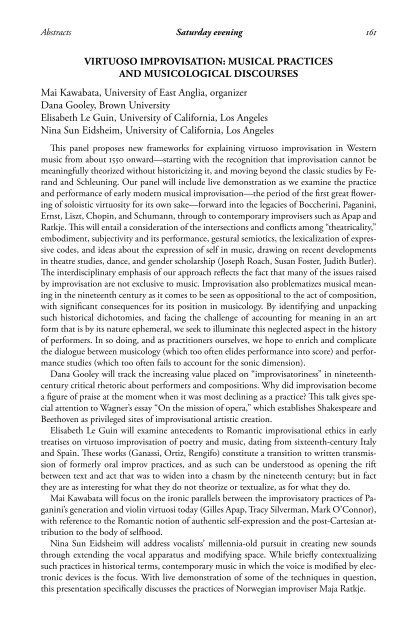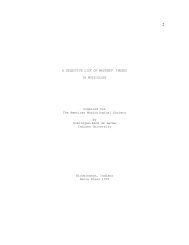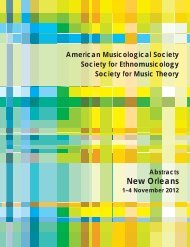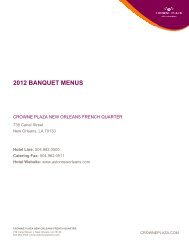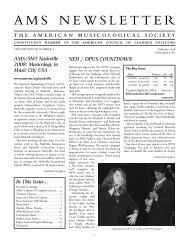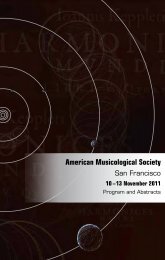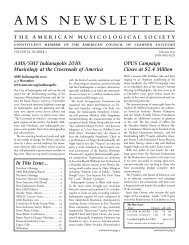AMS Philadelphia 2009 Abstracts - American Musicological Society
AMS Philadelphia 2009 Abstracts - American Musicological Society
AMS Philadelphia 2009 Abstracts - American Musicological Society
Create successful ePaper yourself
Turn your PDF publications into a flip-book with our unique Google optimized e-Paper software.
<strong>Abstracts</strong> saturday evening 161<br />
virtuoso iMProvisAtion: MusicAl PrActices<br />
AnD MusicologicAl Discourses<br />
Mai Kawabata, University of East Anglia, organizer<br />
Dana Gooley, Brown University<br />
Elisabeth Le Guin, University of California, Los Angeles<br />
Nina Sun Eidsheim, University of California, Los Angeles<br />
This panel proposes new frameworks for explaining virtuoso improvisation in Western<br />
music from about 1550 onward—starting with the recognition that improvisation cannot be<br />
meaningfully theorized without historicizing it, and moving beyond the classic studies by Ferand<br />
and Schleuning. Our panel will include live demonstration as we examine the practice<br />
and performance of early modern musical improvisation—the period of the first great flowering<br />
of soloistic virtuosity for its own sake—forward into the legacies of Boccherini, Paganini,<br />
Ernst, Liszt, Chopin, and Schumann, through to contemporary improvisers such as Apap and<br />
Ratkje. This will entail a consideration of the intersections and conflicts among “theatricality,”<br />
embodiment, subjectivity and its performance, gestural semiotics, the lexicalization of expressive<br />
codes, and ideas about the expression of self in music, drawing on recent developments<br />
in theatre studies, dance, and gender scholarship (Joseph Roach, Susan Foster, Judith Butler).<br />
The interdisciplinary emphasis of our approach reflects the fact that many of the issues raised<br />
by improvisation are not exclusive to music. Improvisation also problematizes musical meaning<br />
in the nineteenth century as it comes to be seen as oppositional to the act of composition,<br />
with significant consequences for its position in musicology. By identifying and unpacking<br />
such historical dichotomies, and facing the challenge of accounting for meaning in an art<br />
form that is by its nature ephemeral, we seek to illuminate this neglected aspect in the history<br />
of performers. In so doing, and as practitioners ourselves, we hope to enrich and complicate<br />
the dialogue between musicology (which too often elides performance into score) and performance<br />
studies (which too often fails to account for the sonic dimension).<br />
Dana Gooley will track the increasing value placed on “improvisatoriness” in nineteenthcentury<br />
critical rhetoric about performers and compositions. Why did improvisation become<br />
a figure of praise at the moment when it was most declining as a practice? This talk gives special<br />
attention to Wagner’s essay “On the mission of opera,” which establishes Shakespeare and<br />
Beethoven as privileged sites of improvisational artistic creation.<br />
Elisabeth Le Guin will examine antecedents to Romantic improvisational ethics in early<br />
treatises on virtuoso improvisation of poetry and music, dating from sixteenth-century Italy<br />
and Spain. These works (Ganassi, Ortiz, Rengifo) constitute a transition to written transmission<br />
of formerly oral improv practices, and as such can be understood as opening the rift<br />
between text and act that was to widen into a chasm by the nineteenth century; but in fact<br />
they are as interesting for what they do not theorize or textualize, as for what they do.<br />
Mai Kawabata will focus on the ironic parallels between the improvisatory practices of Paganini’s<br />
generation and violin virtuosi today (Gilles Apap, Tracy Silverman, Mark O’Connor),<br />
with reference to the Romantic notion of authentic self-expression and the post-Cartesian attribution<br />
to the body of selfhood.<br />
Nina Sun Eidsheim will address vocalists’ millennia-old pursuit in creating new sounds<br />
through extending the vocal apparatus and modifying space. While briefly contextualizing<br />
such practices in historical terms, contemporary music in which the voice is modified by electronic<br />
devices is the focus. With live demonstration of some of the techniques in question,<br />
this presentation specifically discusses the practices of Norwegian improviser Maja Ratkje.


